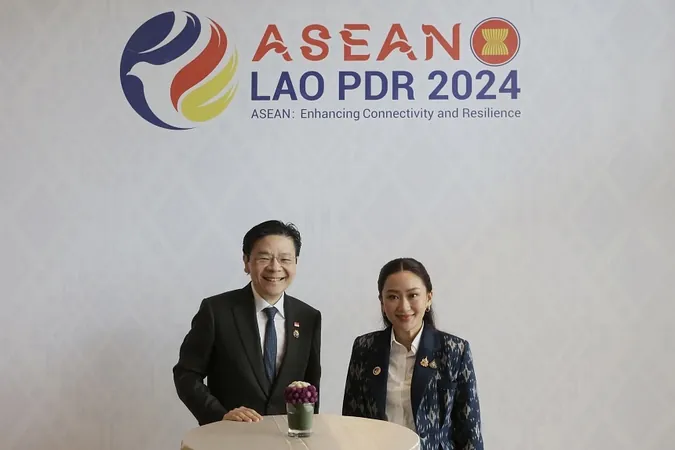
New Leaders Steal the Show at ASEAN Summits—And They’re Not Holding Back!
2024-10-13
Author: Nur
VIENTIANE, Laos
In a display of diplomatic fervor, newly appointed Thai Prime Minister Paetongtarn Shinawatra held a staggering 15 individual meetings with global leaders over three days at the ASEAN summit in Vientiane. This remarkable feat included nearly 20 additional discussions, demonstrating her commitment to strengthening ties within the region.
Laos, with its modest population of seven million, has taken the reins as the rotating chair of ASEAN for 2024, marking a significant moment for one of the smallest member states in the bloc.
The ASEAN framework, built on principles of consensus and non-interference, has faced scrutiny, especially regarding its sluggish response to pressing regional challenges like the ongoing crisis in Myanmar and escalating tensions in the South China Sea. Critics argue that this model hampers effective conflict resolution, making it increasingly important for ASEAN to adapt to a changing geopolitical landscape.
Prime Minister Lawrence Wong articulated this sentiment, emphasizing that the region must adopt a cooperative approach in the face of rising nationalism and protectionism. “ASEAN must showcase that we can choose collaboration over isolation,” he stated on October 12 during his first multilateral engagement since taking office. The collective economic strength of ASEAN’s 10 member states positions them as the third-largest economy in Asia and the fifth-largest globally, allowing for significant influence on the world stage.
The ASEAN Summits also provided a rare opportunity for major powers like the United States, Russia, and China to engage in shared dialogue—a feat not often achieved in international relations today.
A Call for Change: Japan’s Support in ASEAN
Highlighting the urgency of countering China’s growing influence, Japan’s new Prime Minister Shigeru Ishiba reaffirmed his country’s commitment to working alongside ASEAN. “Japan aims to collaborate with ASEAN for a secure and prosperous future,” Ishiba stated, emphasizing maritime security cooperation as a key focus. Japan's continued presence as a dialogue partner, alongside nations like Australia and South Korea, showcases the importance of collaborative regional security efforts.
The Myanmar Dilemma
Once again, discussions surrounding the crisis in Myanmar took center stage during the summit. The country has been embroiled in civil war and economic turmoil since a military coup in 2021, and despite ASEAN's attempts at mediation, violence has escalated. The principles of non-interference leave ASEAN leaders struggling to navigate this thorny issue, as the Myanmar military fails to adhere to the group's peace plan.
Philippine President Ferdinand Marcos Jr. acknowledged the frustration among member states and indicated that ASEAN is "looking for fresh strategies" to tackle the dire situation in Myanmar. Newly inaugurated PM Paetongtarn proposed an informal dialogue amongst all ASEAN members to cultivate a unified message: military solutions are not the answer. This suggestion has the potential to reinvigorate engagement and find resolution to the ongoing conflict. However, previous attempts at such dialogues have often been unilateral, limiting their efficacy.
The Conclusion of an Era for U.S. Engagement
The 2023 ASEAN summit also marked a significant moment for the Biden administration, represented by Secretary of State Antony Blinken. With numerous agreements forged on free trade, digital economies, and security concerns, the summit showcased ASEAN's capacity as a convening power, despite ongoing struggles with critical issues.
While meaningful progress remains elusive, the engagement fueled optimism for mutual benefits, particularly for the 600 million people living in ASEAN nations.
Singapore’s Heartwarming Gesture
In a lighter moment, PM Wong's arrival on a Lao Airlines flight captured the hearts and attention of attendees and media alike. The imagery of him and his wife disembarking from a commercial flight signaled a refreshing departure from ostentatious displays often associated with heads of state. This act of humility resonated well with the Laotian public, as social media buzzed with approval and admiration for the Singaporean Prime Minister.
As ASEAN leaders navigate a turbulent geopolitical climate, with pressing challenges on multiple fronts, their discussions during this summit may prove crucial in determining the future trajectory of Southeast Asia's cooperation. Will these new proposals spark the change needed to foster unity amidst adversity? The world watches closely!


 Brasil (PT)
Brasil (PT)
 Canada (EN)
Canada (EN)
 Chile (ES)
Chile (ES)
 España (ES)
España (ES)
 France (FR)
France (FR)
 Hong Kong (EN)
Hong Kong (EN)
 Italia (IT)
Italia (IT)
 日本 (JA)
日本 (JA)
 Magyarország (HU)
Magyarország (HU)
 Norge (NO)
Norge (NO)
 Polska (PL)
Polska (PL)
 Schweiz (DE)
Schweiz (DE)
 Singapore (EN)
Singapore (EN)
 Sverige (SV)
Sverige (SV)
 Suomi (FI)
Suomi (FI)
 Türkiye (TR)
Türkiye (TR)